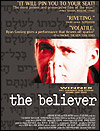| |

THE
BELIEVER CHALLENGES FILMVIEWERS TO LINK GLOBALIZATION
& POLITICAL EXTREMISM
 The
Believer, directed and written by Henry Bean, is the
most controversial film of the year, so any review is bound
to be misinterpreted until the reader sees the film. The story
is based on the book One More Victim by Arthur Gelb
and A. M. Rosenthal, which in turn was inspired by a New
York Times interview with Daniel Burrows, at twenty-eight
years old the number two person in the American Nazi Party,
who was suspected of being Jewish. In the film, skinhead Danny
Balint (played by Ryan Gosling), the central character, purports
to be a Neo-Nazi Jew. In the beginning, as credits roll, we
hear a dispute in a yeshiva about alternative interpretations
of the event in which Yahweh asks Abraham to kill his son
Isaac, with a bespectacled youth arguing that the point of
the story is not to show the benefits of faith in Yahweh but
instead to prove that Yahweh is omnipotent and demands that
believers cast aside rationality and simply obey without question.
The debate is presented as a paradigm for passivity of the
Jews in the face of the Holocaust, which is turn is later
mirrored in the resignation of Danny's father, an invalid
who sits at home resigned to his fate. Next, we see Danny,
some ten years after the debate with his rabbi, rough up a
Jewish student, wearing a yarmulke, for no apparent reason
other than his hatred for Jews. Thus, we see him as a bully
even before we know what his views are as an adult. The
Believer, directed and written by Henry Bean, is the
most controversial film of the year, so any review is bound
to be misinterpreted until the reader sees the film. The story
is based on the book One More Victim by Arthur Gelb
and A. M. Rosenthal, which in turn was inspired by a New
York Times interview with Daniel Burrows, at twenty-eight
years old the number two person in the American Nazi Party,
who was suspected of being Jewish. In the film, skinhead Danny
Balint (played by Ryan Gosling), the central character, purports
to be a Neo-Nazi Jew. In the beginning, as credits roll, we
hear a dispute in a yeshiva about alternative interpretations
of the event in which Yahweh asks Abraham to kill his son
Isaac, with a bespectacled youth arguing that the point of
the story is not to show the benefits of faith in Yahweh but
instead to prove that Yahweh is omnipotent and demands that
believers cast aside rationality and simply obey without question.
The debate is presented as a paradigm for passivity of the
Jews in the face of the Holocaust, which is turn is later
mirrored in the resignation of Danny's father, an invalid
who sits at home resigned to his fate. Next, we see Danny,
some ten years after the debate with his rabbi, rough up a
Jewish student, wearing a yarmulke, for no apparent reason
other than his hatred for Jews. Thus, we see him as a bully
even before we know what his views are as an adult.
|
The same belligerence is later directed toward Blacks and
even toward a daughter of a Christian fascist who wants to
be slapped around by him while having sex. Danny meets that
daughter, Carla (played by Summer Phoenix), at a soiree organized
by Lina (played by Theresa Russell). After Danny enters the
fascist's residence, where a discussion is in progress, Danny
expounds the view that Jews should be exterminated. Yet later,
when Lina organizes a lecture for Danny, he surprises her
by saying that the way to defeat the influence of Jews is
to love them so that they assimilate, that is, for Jews to
intermarry and thereby to lose their identity. Moreover, he
suggests that Jews invented anti-Semitism to draw attention
to themselves so that they would not be assimilated. Some
of the latter views have, of course, been articulated elsewhere,
including the pages of the New York Review of Books,
so what is unusual about The Believer is that
they appear undigested in a film that can best be evaluated
by purchasing the video to show to a group, followed by discussion.
Clearly, the most profound theme that runs through is similar
to Fight Club (1999),
namely, that globalization has brought about such anomie that
human needs for community and other traditional values are
no longer addressed by the major political leaders, so solutions
outside the mainstream are all that are left. But that theme
is eclipsed by endless arguments about the contradictions
of Jewish theology, including the irrational ravings of Danny,
a mentally disturbed forklift operator who works in a fast
food warehouse, envies Jews who are rich, pumps iron to feel
macho, and assaults poor people. MH
|
|